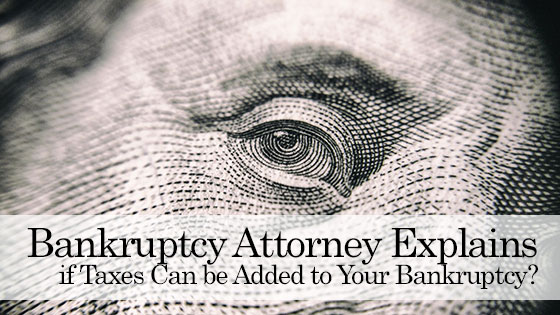Can Taxes Can be Added to Your Bankruptcy?
Bankruptcy seems like credit death, yet you somehow are given relief and the freedom to start over. Whether you decide to file a chapter 7 or a chapter 13 can mean everything in what you can keep and what you must liquidate. After you take the “Means Test,” you will know which chapter is best for you and your situation. There are still probably some lingering questions about taxes, student loans, and other debts.

First, you should know that while most debts are liquidated during a chapter 7 bankruptcy, not all debts are wiped away. In chapter 13, you reorganize the debt paying back pennies on the dollar. Including tax debt in your bankruptcy petition seems logical. Though, it is best to turn to a bankruptcy attorney is when tax debts are looming. However, if you are looking for quick answers, you should know that the age of the debt means everything. When you owe the IRS for past-due taxes, it is not considered a debt that can be wiped away. However, here are a few exceptions to the rule:
- Only Taxes to The IRS Can Be Discharged
First, you must realize that the only type of taxes that can be discharged are those owed to the government for income. Other taxes, like payroll and any penalties for delinquent payments, will not be dischargeable.
- No Fraudulent Debts Will Be Considered
Critical factors include whether the tax debt is due to any type of fraud. The government considers the debt caused from deception when you have a willful evasion, or you use a social security number on your tax forms that is invalid. In these instances, bankruptcy will not clear the debt.
- The Three-Year Rule
While many tax debts can be discharged, they must be at least three years old. Additionally, the return must have been due 36 months before your bankruptcy petition is filed.
- The Return Must Be Filed
Filing a late return, even if the debt is from three years ago, can keep you from getting a discharge. You must file the tax return at least two years before you ask the court for relief. You cannot file bankruptcy on taxes that have not been filed with the IRS. Some courts are more lenient on this rule than others. In some areas, if you meet all the other timeline criteria, then they will allow you to include your taxes too.
- The 240-Day Rule
Finally, you must pass the 240-day rule. The IRS must have assessed your debt at least 240 days before you file for bankruptcy relief. If your liability has not yet been assessed, then you cannot include it in your petition. An exception may be allowed if the IRS stopped all collections activity on your account because there is an offer in compromise pending.
If you are considering filing for bankruptcy relief from the court, you must know that tax debt is just one small part of the petition. There are many things that can be included and some that are never dischargeable. Only a bankruptcy attorney can look at your situation and tell you if you meet the criteria for a chapter 7 or chapter 13 and if you qualify to have your taxes discharged.
The process of filing a bankruptcy petition comes with lots of paperwork and plenty of questions. While many people file for the court’s protection alone, it is always best to have the help of a bankruptcy attorney. One missed deadline or form filled out wrong can cause your case to be dismissed. Call our law offices today at any of our convenient locations and get a free consultation.
Arlington (817) 522-4451
Denton (940) 222-4060
Dallas (972) 362-6848
Fort Worth (817) 764-1375
Cedar Hill (972) 338-9427
McKinney (469) 522-3688
Lewisville (972) 354-4605
Frisco (972) 725-7681
You can also contact us online by using our quick contact form.










